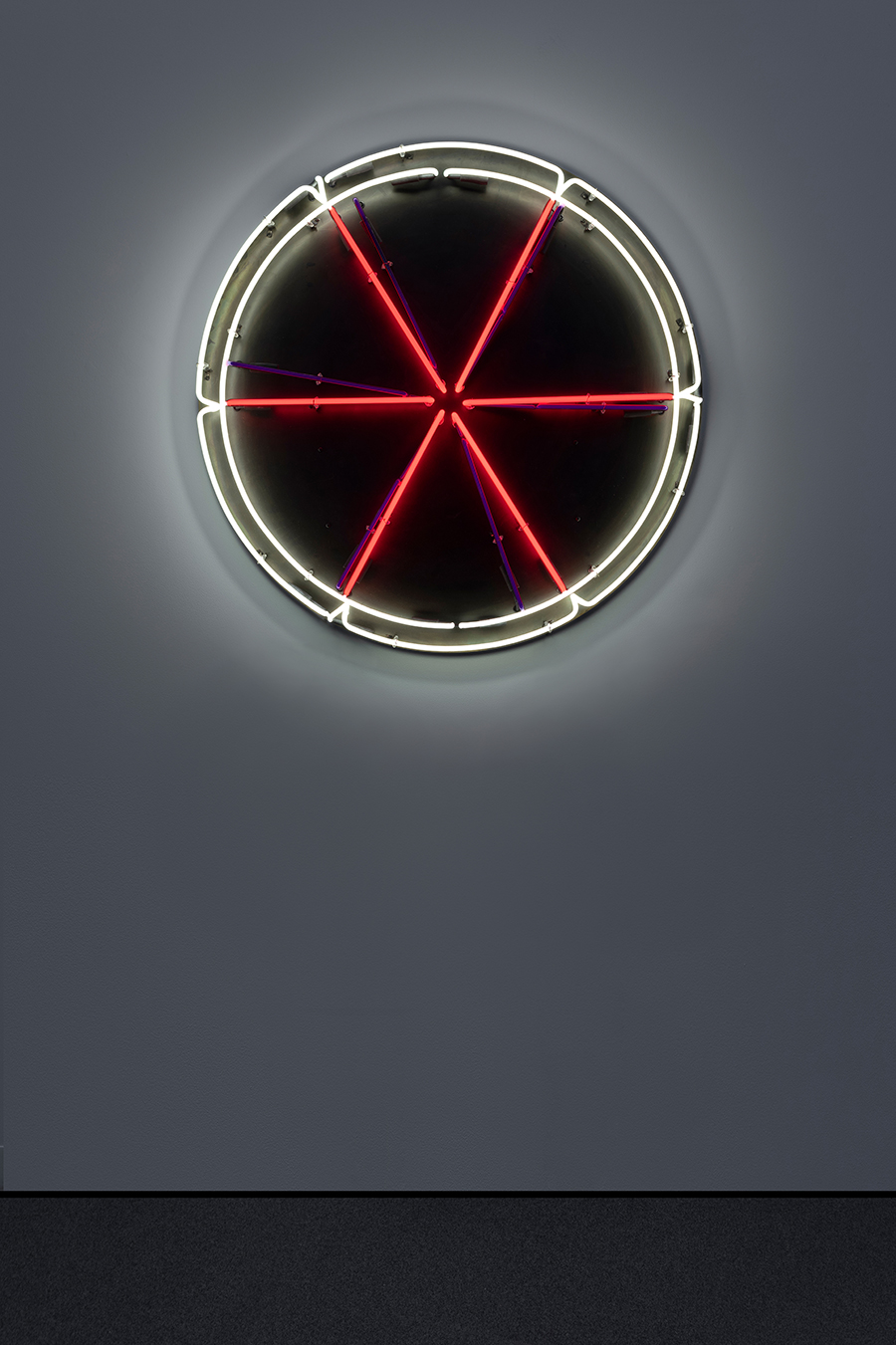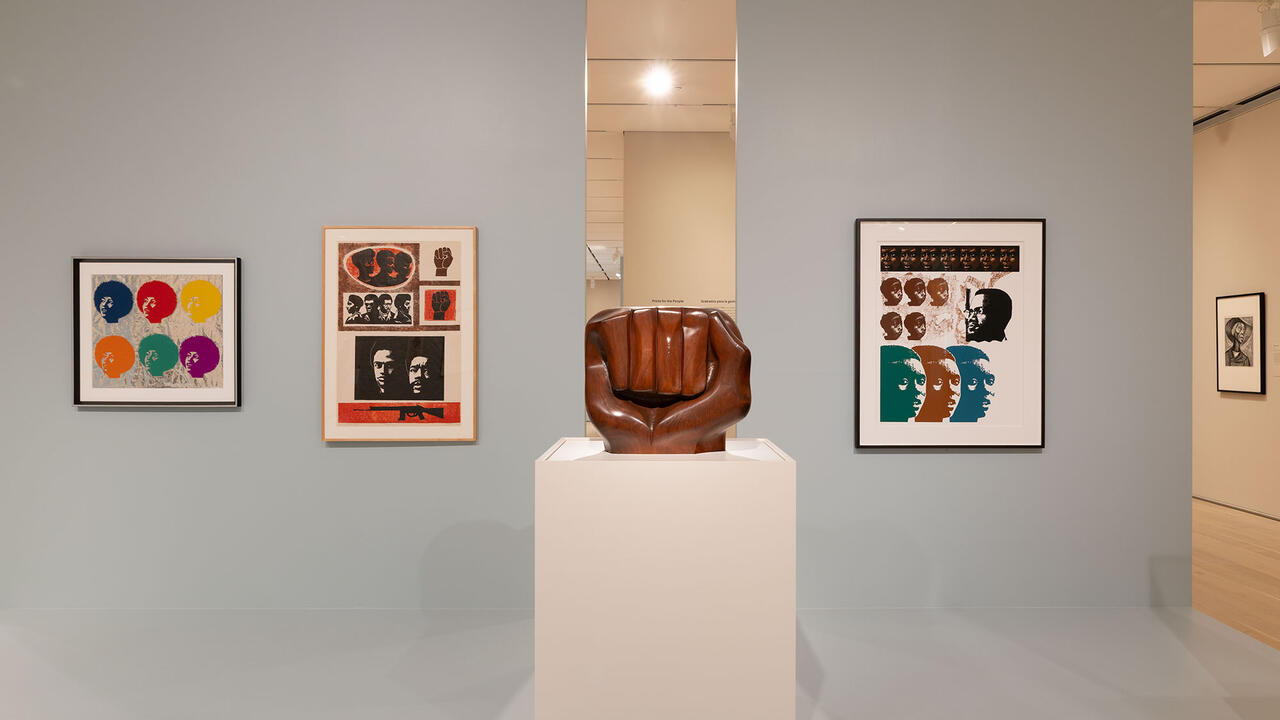Theaster Gates Tackles the Grammar of Race, Mass Incarceration and Poverty
At Richard Gray Gallery, sociological statistics meet medieval sculpture in a powerful commentary on black life in the US
At Richard Gray Gallery, sociological statistics meet medieval sculpture in a powerful commentary on black life in the US

A red and white neon circle glows at the entrance to the Gray Warehouse. Progress Mill (2018), the first work in Theaster Gates’s exhibition ‘Every Square Needs A Circle’, is based on a pie chart depicting the share of black and white workers by occupation in Georgia, compiled by the civil rights leader W.E.B. Du Bois and students at Atlanta University for the Paris Exposition Universelle in 1900. The graph indicated that 40 years after the abolition of slavery in the US, most black people were still working low-wage agricultural or domestic service jobs. Gates has been incorporating Du Bois’s stunningly modernist social graphs into his practice since he first encountered them in 2012. Stripped of their informatics, these signs become abstract visualizations of economic and racial disparity.

A second neon, this one monumentally scaled, hangs in front of an elevated platform in the middle of the room, blocking a direct view of the sculptures the artist has installed there. Gates acquired the base of Mama’s Milk (2018) from the Rothschild Liquor Mart chain in Chicago. The work bears its titular phrase in white neon script atop the logo of its previous owners, in a glib reference to the pervasiveness of liquor stores in impoverished minority neighbourhoods – food ‘deserts’ where they often double as the nearest grocer – and a pun on the lack of nourishment these stores offer.
To the left, Gates has locked a stylized bronze Madonna and child sculpture in a metal storage cage, where it rests on a granite block and plush rug. With its dark patina, Alls my life I has to fight (2019) depicts an imprisoned black mother and child, whose globus sans cruciger, a symbol of authority stripped of its holy power, suggests the crippling effects the mass incarceration of black women has on their children.

On the opposite wall, Two Circles (2018), a steel shelf packed with issues of Artforum bound in bright chartreuse, rests above two Eames-like chairs upholstered in the same hue. Along the spine of each volume, Gates has embossed phrases he selected from the magazines, which together form an exquisite corpse poem, which ends: ‘I wait for the #75 bus / But on Sundays it runs slow / And these streets / Ain’t nothing out here in these streets / Ragged billboard.’ The work’s title suggests two circles of influence – ‘high’ art and everyday experience – that constantly overlap and repel each other.
In the middle of the room, Gates has elevated an array of objects both exquisitely crafted and mundane – a hewn tree stump, a coiled ceramic vase, a rock and a white Egungun mask with hare’s ears, used for Yoruba ancestor worship – on a raised plinth, its gridded flooring lettered A-I like a temple in the midst of an archaeological excavation. Although its meaning is opaque, the untitled installation’s sacral arrangement endows each object with an auratic presence, as though they might be amulets of àṣẹ, the transformative power to effect change.

Du Bois was one of the first sociologists to study black life in the Deep South with rigour, producing data sets that logged to historical record people condemned to the margins of the Gilded Age. Gates’s own archival projects, from the Jet library he maintains at Stony Island Arts Bank, the Chicago cultural centre he founded, to his installation works featuring linen-bound periodicals, are part of what the artist has called the act of ‘exhuming language’. This disinterment seeks to rectify the history of modernism and reify a culture that the canon has sought to erase. Gates proposes a modernism that re-centres black spirituality – one that takes into account the history of oppression while ultimately seeking to transcend it.
‘Every Square Needs A Circle’ runs at Gray Warehouse, Richard Gray Gallery, Chicago, until 29 June 2019.
Main image: Theaster Gates, Two Circles, 2018, linen-bound Artforum magazines and chairs, dimensions variable. © Theaster Gates; courtesy: Richard Gray Gallery






















